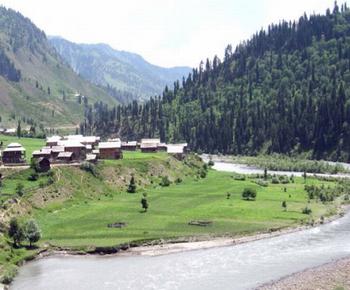
由於巴基斯坦政府欲強制執行禁伐令,於喀什米爾印巴控制線上、尼勒姆(Neelum)河谷工作的木材廠工人布特擔心其飯碗不保。
布特和他的同事憂心,禁伐令將導致其服務的工廠--「自由喀什米爾木材廠」(AKLAS)關閉。這個半公有的公司,從巴屬喀什米爾地區獲取木材,並供給全巴基斯坦的公司。
布特表示:「森林是我們的一切。我的妻子從鄰近的森林帶回飼料和燃料用木材,我的孩子也從那採集蘑菇。」然而,他不了解附近森林遭受砍伐的環境後果;他的木材廠老闆也沒有考慮到森林資源枯竭所造成的巨大損失。
目前,自由查謨和喀什米爾(Azad Jammu and Kashmir, AJK)政府正規劃包括禁伐令在內的數項森林保育措施。禁伐令最初是在1997年提出的,但由於缺乏政治決心因此沒有確實執行。據稱,此禁伐令使政府相關人員因貪污與捲入木材貿易而受益。
當地貿易商也對政府的保育措施感到憂心。商人卡瓦賈擔心地表示:「政府執行禁伐令,將使倚靠木材業維生的3000人失業。」
另一方面,生態學家和環保人士則讚揚政府的計劃,並要求保護森林。
自由查謨和喀什米爾邦(AJK)擁有全國42%的林地,這13297平方公里的森林由國家森林部管轄。
根據當地森林法,政府僅可在林業官員進行必要的評估後,出售受損樹木。但是,勢力龐大的山老鼠卻藉由收穫病樹或倒木的掩護,非法砍伐並走私健康的樹木。
有時,山老鼠甚至放火燒山,故意將樹木「正當地」變成受損木材;然而這種做法對當地森林和野生動物棲地造成巨大損失。官員承認,過去 20年AJK邦超過5%的森林已消失。
這片生態區域對許多瀕危物種十分重要。當地的溫帶森林是由雪松(Cedrus deodara)、馬尾松 (Pinus gerardiana)和冬青櫟(Quercus ilex)這種大型常綠橡木所組成。大多數木材出售給巴基斯坦的家具和地材公司,這些公司再將產品賣給歐美客戶。
生態學家拉赫曼(Ejaz Rehman)表示,當局應採取更多打擊非法和分永續伐林的措施採伐。他說,關閉木材公司不是控制伐木的解決方法。政府與當地居民應共同合作。最好的解決辦法是強化並對AKLAS和森林部提供資源。
許多生態學家表示,如果政府想要保護AJK的森林,應為當地社區提供替代燃料的資源,並執行國際和地方森林保護法,以阻止這偉大的環境遺產資源耗竭。
Yousaf Butt, a timber worker in the Neelum Valley at the Line of Control in Kashmir, is worried about his job because of government plans to enforce a ban on the cutting of trees.
Butt and his colleagues fear the decision will shut down operations of their employer, Azad Kashmir Logging and Saw Mills, AKLAS, a semi-government firm that extracts timber from Pakistani Kashmir and supplies the wood to companies across Pakistan.
"Jungle is everything for us. My wife brings fodder and fuel wood and children collect mushrooms from nearby forest,"
says
Butt. He is not aware of the environmental consequences of tree felling
in his area, nor do his bosses consider the great loss caused by the
depletion of forests.
Currently, the government of Azad Jammu and Kashmir is planning forest conservation measures, including a crackdown on the cutting of green trees. A ban was initially proposed in 1997 but was not implemented because of lack of political will and alleged benefits gained by government functionaries who are accused of corruption and involvement in the timber trade.
Local traders have similar concerns about government conservation measures. "By imposing a bar on the cutting of trees, government wants to make 3,000 jobless who earn their daily bread from the timber business," fears trader Shafiq Khawaja.
On the other hand, ecologists and environmental campaigners hail the government's plan and demand protection of the forests.
AJK is known as a forestry state with 42 percent of its 13,297 square kilometres (5,134 sq miles) under the control of the Forest Department.
According to state forest laws, the government can sell only damaged trees after a necessary assessment by forest officials. However, powerful timber mafia illegally chop and smuggle green trees under the cover of operations to extract sick or fallen trees.
Sometimes, forests are set on fire by the timber mafia to justify the damage of trees, a practice which has caused enormous loss to local forests and wildlife habitats.
Officials admit that during the last 20 years more than five percent of the AJK forests have vanished.
This eco-region is a prime location for endangered plant and animal species. These temperate forests are of Himalayan Cedar, Cedrus deodara; Chalghoza pine, Pinus gerardiana; and Holm oak, Quercus ilex, a large evergreen oak.
Most of the wood is sold to Pakistani furniture and flooring firms, which make products for customers in Europe and the United States.
Ecologist Ejaz Rehman says that authorities should do more to clamp
down on illegal and unsustainable logging. "To shut down institutions
is not the solution to control the cutting of trees," he says. "There
should be co-operation among institutions and local people. The best
solution is to strengthen and equip both AKLAS and the Forest
Department."
Ecologists say that if the government wants to
protect the AJK forests, it should provide alternative fuel resources
to local communities and enforce international and local forest
protection laws to stop the depletion of this great environmental
heritage.
摘譯自2010年1月25日ENS巴基斯坦查謨、喀什米爾穆紮法拉巴德報導;王茹涵編譯;蔡麗伶審校
from:環境資訊中心


 留言列表
留言列表
